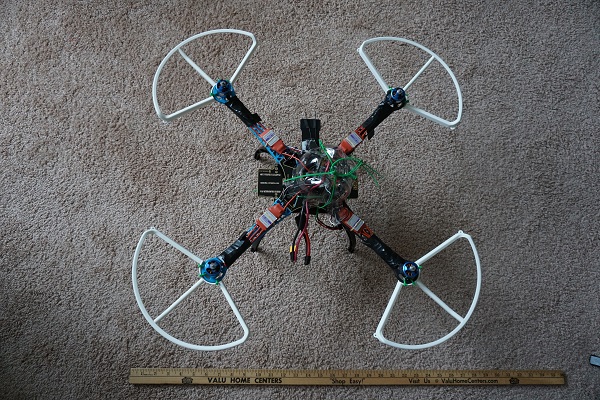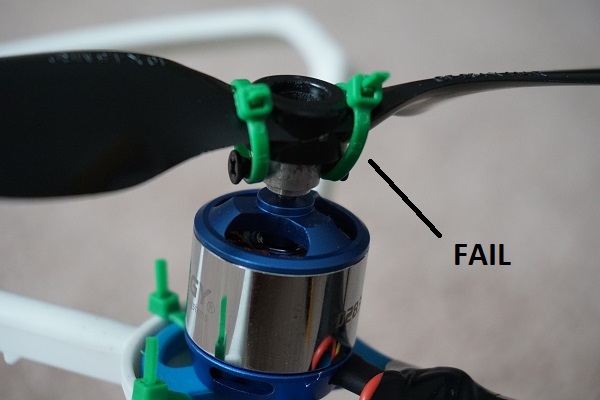At one month into the project, all the parts have been identified, ordered, and received1, and the drone has been assembled. These are the main components:
| Component | Link |
|---|---|
| S500 Glass Fiber Quadcopter Frame 480mm - Integrated PCB Version | Link |
| Turnigy D2830-1100KV 305W Brushless Outrunner Motor (22.5A max) | Link |
| TURNIGY Plush 30amp Speed Controller w/BEC2 | Link |
| Matek BetaFlight F405-CTR Flight Controller Built-in PDB OSD 5V/2A BEC Current Sensor for RC Drone Multicopter | Link |
| Gemfan Glass Nylon 1045 2- Bladed Propeller Blue (CW/CCW) (1 Pair) | Link |
| FrSky R-XSR Ultra Mini Redundancy Full Telemetry Receiver | Link |
| FrSky 2.4G ACCST Taranis Q X7 16 Channels Transmitter Black | Link |
| Graphene Panther 2200mAh 3S 75C Battery Pack (11.1 volts) | Link |
| Turnigy Reaktor 250W 10A 1-6S Balance Charger | Link |
| Turnigy Reaktor Pro 240W 16A Power Supply 100~240V AC (US Plug) | Link |
| HobbyPark Bullet RC Airplane Prop Adapter Holder Hubs Spinner Saver For 3.0mm Shaft Brushless Motor | Link |
| Betaflight Configurator (free) | Link |
Though the drone is assembled and "works," it still doesn't hover in a stable manner. One possible reason is that the props aren't installed properly, or aren't balanced.
Aside from flying off occasionally (discussed below), the props could also be causing excessive vibration. (Even properly installed and balanced props will cause some vibration.)
Vibration affects the accelerometers3, accelerometers are used by the gyroscope, and accurate gyro data is needed by the flight control board (FCB) for stable flight.
PID4 tuning hasn't helped much so far; maybe it can't overcome the vibration. (More about PID tuning in future posts.)
So to improve any possible vibration problems, we plan to install anti-vibration grommets in the FCB's PCB5 mounting holes.
If that doesn't work, we may need to further isolate the FCB board somehow. Maybe we'll even need a little vibration analysis using an iPhone app6.

Our drone sports a clear plastic dome made from the bottom of a Pepsi bottle that C14 improvised.
It is designed to protect the Matek FCB inside. Light and strong, green zip ties secure the dome in place.
We've attempted to fly7 the craft several times already, but the props (not shown) keep coming off. One even flew off into my chest, inflicting a 1" gash. At 10" long and spinning at 10,000 rpm, drone propellers are like whirling razor blades. Be careful!

The props were previously attached to set screws on a 3mm prop saver
using green zip ties as shown above.
But even though they were cranked down firmly, they still either broke or slipped off multiple times. Fail!
(We originally tried the rubber O-rings that came with the prop savers, but they too flew off.)
Next we're going to try these collet-style8 propeller adapters.
(The L-shaped wrench tool goes through two holes on top of the bullet and is used to tighten it onto the prop.
That tightening action in turn squeezes the collet at the botton onto the motor shaft.)
We plan to install the new collet prop adapters and anti-vibration grommets later this week.
Happy flying!
2BEC stands for battery eliminator circuit. The electronic speed controller (ESC) has a built-in DC-to-DC converter (BEC) that provides 5V DC for other components, thus eliminating the need for other batteries. We don't need the ESC BECs because our flight controller provides one, which we use to power the receiver.
3Accelerometers convert mechanical x-y-z motion into electrical signals that the gyroscope can read.
4PID stands for proportional–integral–derivative. PID variables are used to tune the flight characteristics of your craft. They are adjusted through the Betaflight Configurator application. PID is a widely used control mechanism, especially in embedded systems.
5PCB- printed circuit board.
6One such vibration analysis tool for the iPhone is here.
7We're just trying to get it to hover reliably a few inches off the ground. Not successful yet.
8According to Wikipedia, "A collet is a subtype of chuck that forms a collar around an object to be held and exerts a strong clamping force on the object when it is tightened, usually by means of a tapered outer collar. It may be used to hold a workpiece or a tool."